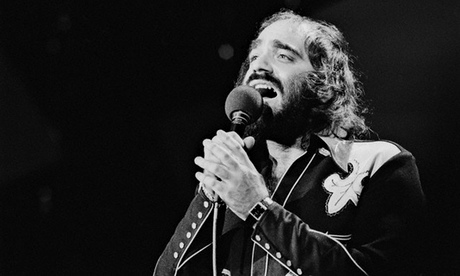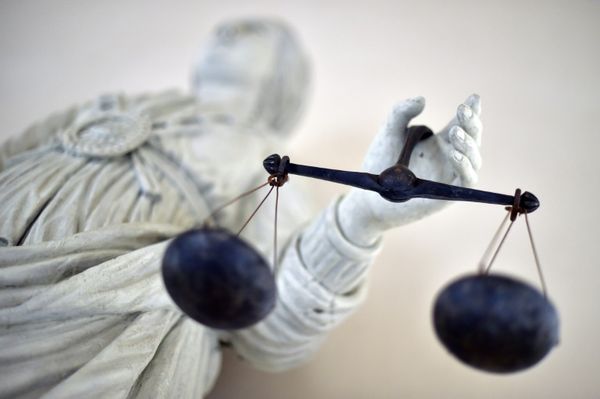
Demis Roussos, the Greek pop and rock singer who became an unlikely international star in the 70s and 80s, famed for his soaring, high-pitched voice and voluminous kaftans, has died aged 68.
The death of Roussos, who had a No 1 UK single in 1976 with Forever and Ever, was confirmed by the Hygeia hospital in Athens, the BBC reported. He had been receiving treatment for some time for an undisclosed illness, the BBC said.
Roussos, who also had notable solo hits with Goodbye and Quand Je T’Aime, was viewed as something of a kitsch figure during his heyday, an image cemented by Mike Leigh’s 1977 BBC TV play Abigail’s Party, in which Alison Steadman’s social-climbing party host tries to impress her guests with her fondness for the singer.
Nonetheless, while the peak of his success was brief, it was considerable. In a 1999 interview with the Guardian, Roussos recalled a moment in the mid-70s when he had five albums in the UK top 10 at the same time.
Roussos started in the late 60s in Aphrodite’s Child, a pioneering Greek trio seen as one of the originators of progressive rock. Also in the group was Vangelis, who later composed the film scores for Chariots of Fire and Blade Runner. The band’s final release, 666 – a double album based on the Book of Revelation – is viewed as one of rock’s first concept albums.

Roussos was born Artemios Ventouris Roussos in Alexandria, Egypt, to Greek-origin parents who had also been born in Egypt. Roussos studied music and sang in the city’s Greek church until, as a teenager, his parents were forced to move to Greece, penniless, following the Suez crisis.
In Athens, Roussos played guitar and sang with the group, the Idols, later meeting Vangelis, who had a major influence on his career.
As part of Aphrodite’s Child, Roussos had planned to base himself in London but work permit problems meant the group ended up in Paris, and it was France where they became most successful.
When the group split following the recording of 666, Roussos began a solo career, having immediate success in 1971 with the single We Shall Dance.
During much of his peak era Roussos cut a sometimes improbable figure in popular music with his significant girth, which reportedly peaked near 150kg. He later lost much of this and co-authored a diet book, A Question of Weight.
In 1985 the singer was on a TWA flight from Cairo to the US that was hijacked by armed men seeking the release of Arab prisoners from Israeli jails. Roussos was among eight Greek nationals freed after their government released a Hizbullah member.
In the 1999 Guardian interview Roussos dismissed as “bollocks” reports that he sang for the hijackers. He did, however, concede surprise at his former status as a sex symbol: “Yes. Because I never consider myself a sex god. I love women, I always liked women – no secret about that. It did surprise me, but when someone is at the top of the limelight of success, it is normal.”
Roussos also expressed pride at his immortalisation in Abigail’s Party: “It was fun, this woman mentioning my name. But you see, that means I left my mark into the century. Nobody can deny that my name left a mark into the century’s music.
“Even if I die tomorrow, Demis Roussos left a card, a trademark, something that cannot be forgotten.”







